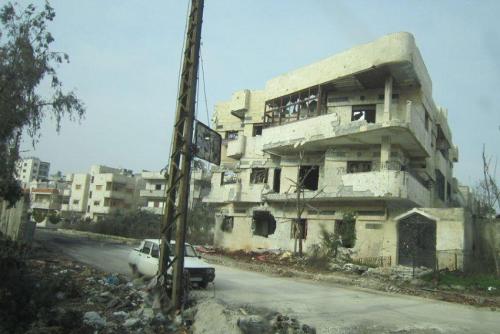Syria: UN human rights office underscores civilian protection amid ongoing fighting in Homs
The United Nations human rights office said it is “extremely concerned” about up to 4,000 civilians who may be trapped by heavy fighting in and around the Syrian city of Homs, where a major Government offensive has been underway for more than a week.

A look at some of the destruction in Homs (March 2012).
“We call upon all parties to respect their obligations under international law, avoid civilian casualties and allow trapped civilians to leave without fear of persecution or violence,” the spokesperson for the Office of the High Commissioner of Human Rights (OHCHR), Rupert Colville, told journalists in Geneva.
“We also call for unrestricted and immediate humanitarian access to all conflict-affected populations in besieged areas,” Mr. Colville added.
OHCHR believes between 2,500 and 4,000 civilians, including women and children, are still trapped in and around Homs facing shortages of food, water, medicine, electricity and fuel.
“According to information just received, the Al-Khaldiya neighbourhood has been experiencing heavy shelling since the early hours of this morning,” said Mr. Colville.
Armed opposition groups are operating inside residential areas increasing the risk for civilians, he added citing recent reports.
The siege began 13 months ago but has escalated since June 28 following a major offensive launched by the national forces and affiliated militias to retake several opposition-controlled districts.
Out of 16 residential districts affected by the siege, shelling and ground attacks in Homs and in the surrounding area, Al-Khaldiya and Baba Houd districts appear to be the worst hit.
According to the UN, more than 93,000 people have been killed since fighting began in March 2011 between the Syrian Government and opposition groups seeking to oust President Bashar Al-Assad.
Meanwhile, UN food and agriculture agencies reported that Syria's food security situation has “significantly” deteriorated over the past year with four million people unable to produce or buy enough food, and the situation will further decline over the next 12 months if the conflict continues.
The food insecurity driven up by massive displacement of people, disruptions to planting and harvests, economic sanctions, currency depreciation and high food and fuel prices, according to the UN Food and Agriculture Organization (FAO) and the World Food Programme (WFP).
“There is a limited window of opportunity to ensure crisis-affected families do not lose vital sources of food and income,” the UN agencies said in a report issued after a Crop and Food Security Assessment Mission visited Syria between May and June.
Syria's wheat production is 40 per cent less than the annual average and about 1.5 million tonnes of wheat will need to be imported for the 2013/2014 season, the report said.
In addition, the price of wheat more than doubled between May 2011 and May 2013 in parts of the country, while other parts do not have any bread at all.
The conflict, including a lack of access to vets and to vaccines, has also impacted husbandry. Poultry production is down more than 50 per cent compared with 2011, with sheep and cattle numbers also lower than the average.
The United Nations has launched a $4.4 billion humanitarian appeal – the largest aid request in the Organization's history – to assist the growing number of people suffering the effects of the crisis in Syria.
The appeal includes $1 billion that would enable the World Food Programme (WFP) to scale up its distribution of food both inside and outside Syria. The agency currently distributes food to more than 800,000 people outside Syria and an additional 2.5 million inside the country. With additional resources, the agency said it hopes to reach a total of 7 million Syrians by late 2013.
FAO said is seeking $41.7 million to assist 768,000 people with seeds, fertilizer and veterinary supplies, as well as cash-for-work programmes. Only $3.3 million or less than $10 per cent has been funded, the UN agency said.
“Support for the coming planting season will be critical,” the Rome-based agency added.
Funding must be secured by August to provide farmers with fertilizers and seeds to plant in October. Without this support, many wheat farmers will not be able to harvest until mid-2015.
Source: UN News
- 516 reads
Human Rights
Fostering a More Humane World: The 28th Eurasian Economic Summi

Conscience, Hope, and Action: Keys to Global Peace and Sustainability

Ringing FOWPAL’s Peace Bell for the World:Nobel Peace Prize Laureates’ Visions and Actions

Protecting the World’s Cultural Diversity for a Sustainable Future

Puppet Show I International Friendship Day 2020

